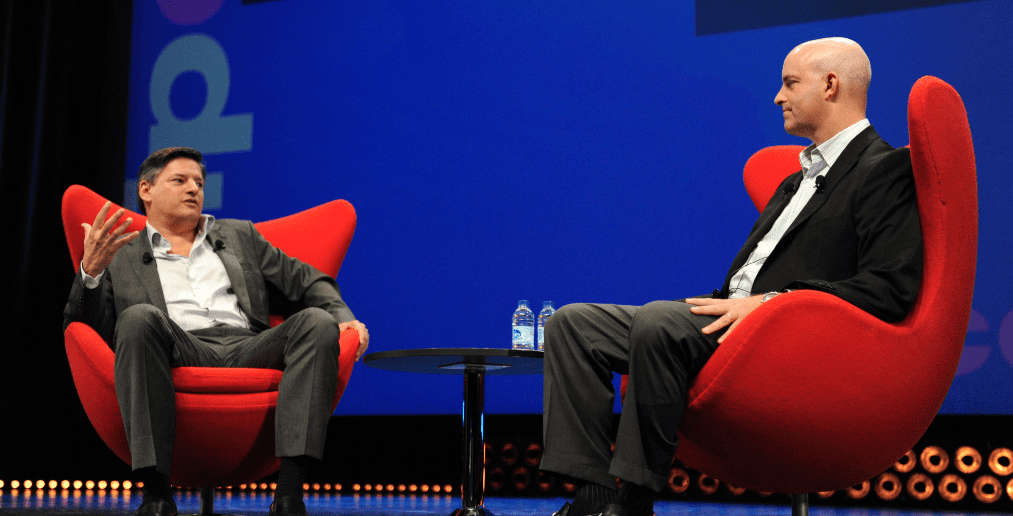Subscription-based TV and movies service Netflix has been causing quite a stir among rightsholders, with some embracing its disruptive business model, and others concerned about its impact on their existing distribution channels.
Today’s lunchtime Media Mastermind keynote session saw a joint appearance by Miramax CEO Mike Lang and Netflix chief content officer Ted Sarandos, and provided the opportunity to discuss some of these sensitive but important issues. Lang kicked off with a keynote speech.
The new Miramax was launched just over a year ago, with the aim of making the most of its library of movies. “Miramax was basically closed for business,” noted Lang. “We believed in the power of the library… Basically, the future had to be innovate or die.”
The company had more than 700 films in its archives, from Pulp Fiction and Chicago to Shakespeare In Love. Lang said making the most of this library has been about not being scared to fail when trying new things. “In a way I’d like to believe our company is a bit more Silicon Valley than Hollywood in that respect,” he said.
That includes long-term deals with Hulu and Netflix, as well as launching a Miramax- eXperience branded app, which lets people watch movies across Facebook, iPad and Google TV. “We believe that cross-platform is key to growing the digital transactions business,” said Lang. Miramax is also launching its own Miramax Network cable network, and talking to potential partners around the world.
“We believe that all these different platforms can be complementary and co-exist together,” he added. “We think everything starts with the consumer. They’re not focused on windows or on what schedule they can watch something or on which device.”
At this point, Netflix’s Sarandos joined Lang on-stage for a one-to-one chat. Lang started by asking why Netflix recently split up its streaming and DVD businesses. “We were actually born as a digital distribution company at heart,” said Sarandos. “As we become a global brand, and a streaming global brand, the DVD-by-mail business is strictly US and domestic.”
This ties in to Netflix looking for global rights for films and TV shows, rather than US-only deals like its agreement with Starz. “Global licensing is always kind of a pipedream,” he admitted, before expressing the view that “in a purely digital world, there really is no need for fragmentation“.
Sarandos also talked about Netflix’s desire to take content that is popular in one part of the world and bring it to other territories, while saying that this involves throwing our preconceptions about what people may or may not want in specific countries. “If you want to see what people really want, look at what they’re stealing,” he said.
Sarandos then posed some questions of his own for Miramax’s Lang about his company’s strategy. “We’re starting to build the building blocks that ultimately could be more than the library itself,” said Lang. International distribution is key to that, as is the company’s desire to own and operate its platforms, whether that be cable networks or Facebook apps.
Does he distinguish between the digital and the traditional TV business? “When we have conversations with TV buyers, one of the first questions they ask is ‘How can we access the digital rights?’,” he said, before moving on to piracy.
“Piracy really is not the bigger issue for our company or for our library. It’s been lack of exploitation, just not getting it out there… Most consumers at some point in their life don’t want to pirate. The way to then react to that is to offer legitimate, great service for them to access it… We’re going to see a lot more demand because of that. Our driver is more market-based versus piracy.”
Lang asked about Netflix’s algorithmic “secret sauce” behind its streaming business, and what kinds of content are more valuable as streams than as DVDs rented through the post. Sarandos said that while the postal service was very movie-centric, “50% and sometimes 60% of viewing is TV episodes now” on the streaming service. He cited Mad Men and Breaking Bad as particularly popular on Netflix.
“That can be mis-perceived as Netflix giving up on movies, which it’s not. It’s just consumers saying what they want,” he said, before suggesting that the data Netflix gathers on people’s TV viewing habits is just as useful for recommending films to them as other TV shows.
Netflix has also been striking deals for original TV content. “The economics of these very highly serialised TV shows are very challenged,” he said. “Those shows are getting tougher to sell. So for us, I’m looking at will there be fewer of them produced?” And he pointed out that the likes of HBO and Starz are making those shows, but they are “the least likely to sell those shows to me!”.
Netflix’s deal to bag David Fincher’s House of Cards is the deal that made the TV industry sit up. But Sarandos announced a new show for the US, Canada and Latin America called Lilyhammer, starring musician-turned-actor Steven Van Zandt, which will be premiered on Netflix. “We’re trying to connect the great content of the world to the people of the world.”
Netflix also has a deal with Dreamworks Animation to screen its films before they are available on free-to-air TV. Sarandos said that his preference would be to avoid expensive exclusive deals of this kind, though, in favour of finding more flexible arrangements for content windows. “Consumers are valuing exclusivity a little bit less, but distributors are still valuing it highly,” he said.
How does Netflix think about building audiences over time for new series? Sarandos admitted that it’s a challenge, since Netflix is about personalisation, which makes it harder to throw its brand behind specific shows as, say, an HBO would do. “We really think we can use these same algorithms to launch a show very rapidly, and put it in the hands of the people who’ll love it the most,” he said. “Let’s build it with the people who will love the show, and then they’ll tell their friends.”
This strategy has already been tried with Starz’ Spartacus, which was seeded on Netflix predominantly with people who loved the film 300, which had a similar setting.
Back to Lang. “We’re very excited about Netflix and other subscription opportunities digitally,” he said, before warning that there are still issues with digital transactions, when tied into Apple’s ecosystem or other devices. This is why Lang likes Netflix, which works across a range of devices.
“There has to be some serious discussions about pricing. Currently the DVD business is probably priced too high,” Lang said. “You’re going to have to be more aggressive, especially for library product.” He was also notably downbeat on the idea of digital movie rentals, and suggested new partnerships will be key to growing a healthy digital transactions market for films. “It really starts less with industry consortiums and studios talking about what they should do, and more about partnering with the strong technology companies and retailers,” he said.
Lang said “there is still a robust market for ownership, even in the physical world“, citing the Pulp Fiction Blu-ray edition that’s coming out with a host of extras. Lang also suggested that the film and TV industry need to stop “carpet-bombing” advertising for their products, and look for more targeted ways of reaching consumers – for example on social networks like Facebook.
Lang asked Sarandos about whether Facebook is a friend or a foe for Netflix, given the fact that some studios are renting and/or selling films directly on the social network. “We’re more of a channel than a platform, and they’re clearly a platform,” said Sarandos, although he went on to admit that Amazon’s recent moves to license films is more directly competitive.
What have the pair learned from the music industry’s approach to digital? Lang said one lesson was the biggest problem was not piracy, but the fact that physical retailers around the world had pulled out of selling CDs, while the rise of digital music stores swapped the model of selling albums for $12.99 for selling downloads at $0.99 each. However, he also pointed to another lesson from music that the TV and movie industries should take heed of.
“Apple is the strongest company in the music industry, and because there was not enough competition, and still to this day is not enough competition, as an industry it can’t then influence, packaging, merchandising… all the things that are vital,” he said.
“As the movie business we have to be very cogniscant of that. That’s why we did our deal with Netflix, and why we also did our deal with Hulu. We want multiple players to be successful… It’s really important as an industry that we try to allow multiple players in markets around the world… Our goal as an industry should be to have as many as possible, ad may the best service win.”
Sarandos also added his own lesson from watching the music industry’s digital strategy down the years: “When consumers tell you what they want, figure out a way to give it to them, because they will figure out a way to get it.”
Lang also suggested that the TV and movie industries should be thinking about ways to add new content to their products digitally, whether that be tying in music, or taking a leaf out of the games industry’s book and selling extra content to people after their initial purchase of a product.
“I don’t think any of us have the answers. It’s really about trying and innovating and testing things out. And being willing in some cases to fail, but learning from that,” added Lang.





14 Comments
Pingback: Is Netflix Doomed? - Page 7
Pingback: MORE THAN HALF NETFLIX’S STREAMS ARE TV SHOWS » LANG, NETFLIX, NETFLIXS, SARANDOS, MIRAMAX, HULU » TECH MAGAZINE
Pingback: More than half Netflix’s streams are TV shows | Freedom Developers
Pingback: Miramax and Netflix talk cross-platform entertainment | The Appside
Pingback: First Kill All of the Video Distributors…Paramount Runs Doomed Experiment | Outside the Herd
Pingback: Miramax CEO says Apple a bigger threat to movie industry than piracy | Go Phone
Pingback: Miramax CEO says Apple a bigger threat to movie industry than piracy | Brian's Blog Site
Pingback: Miramax CEO says Apple a bigger threat to movie industry than piracy | KC-NEWS
Pingback: Miramax ammonisce sul pericolo di monopolio Apple nel cinema
Pingback: Miramax: “el problema es iTunes y no la piratería”
Pingback: Miramax è intenzionata ad ostacolare Apple nell’ascesa nel mondo del cinema — Italiamac
Pingback: ‘Os monopólios ameaçam mais a indústria da música do que a própria pirataria’ « patymarketing
Pingback: Video: Miramax’s Lang & Netflix’s Sarandos Interview Each Other At Mipcom — paidContent
Pingback: Content is changing consumer electronics | Abhir Dayaram